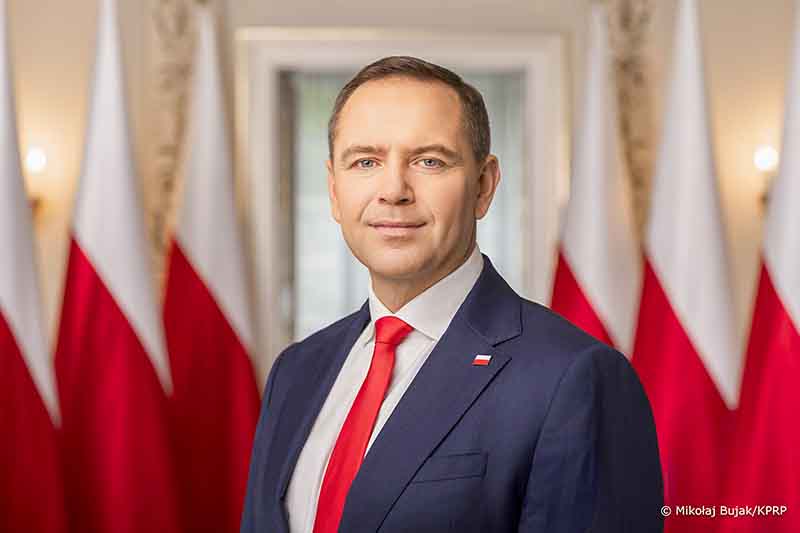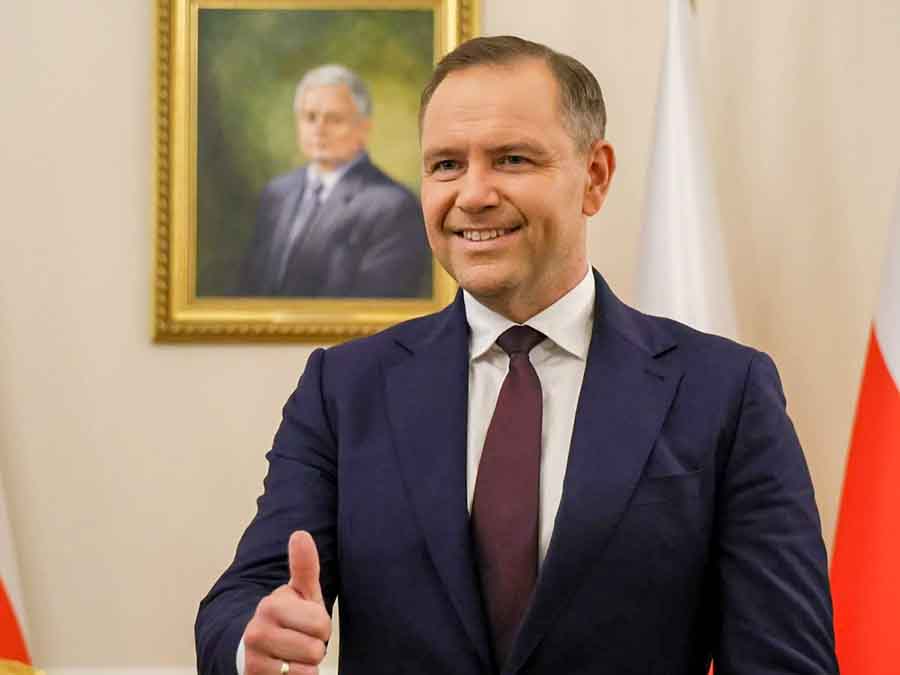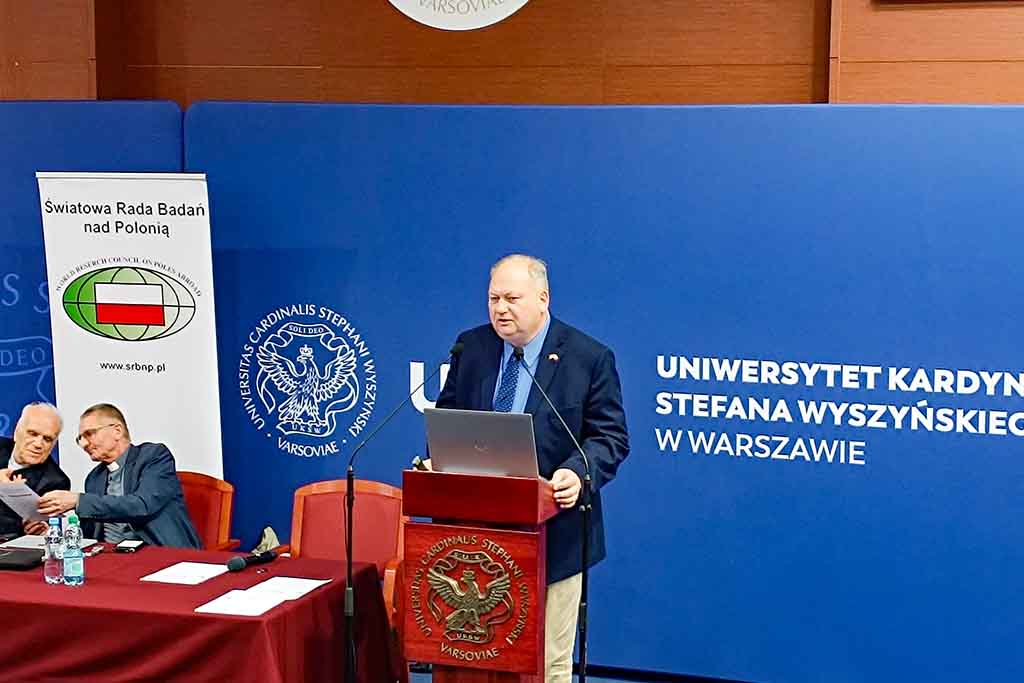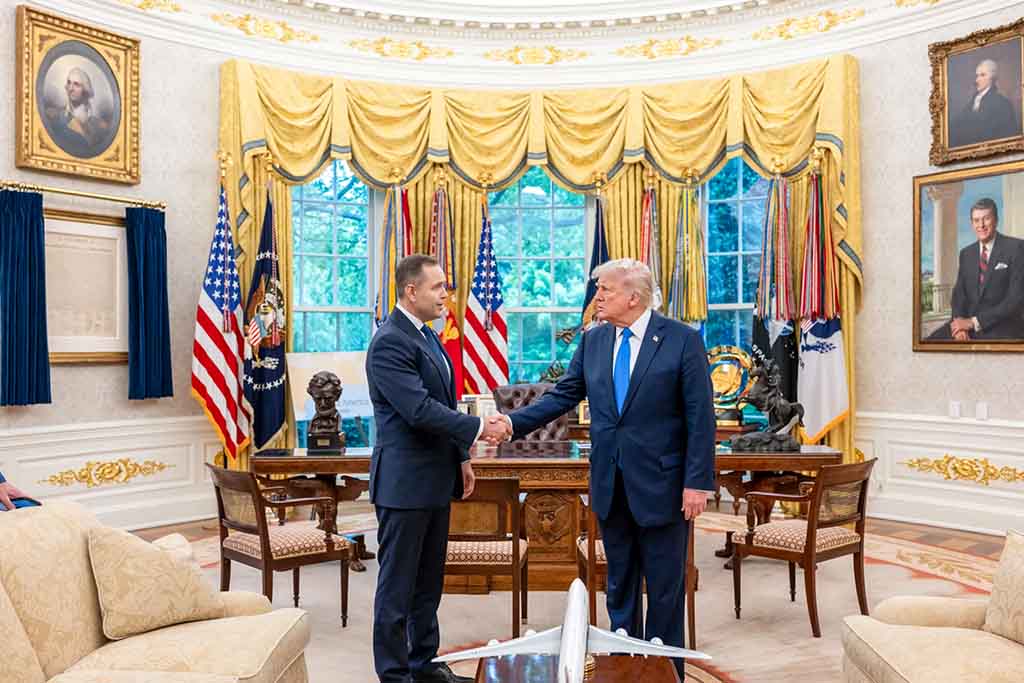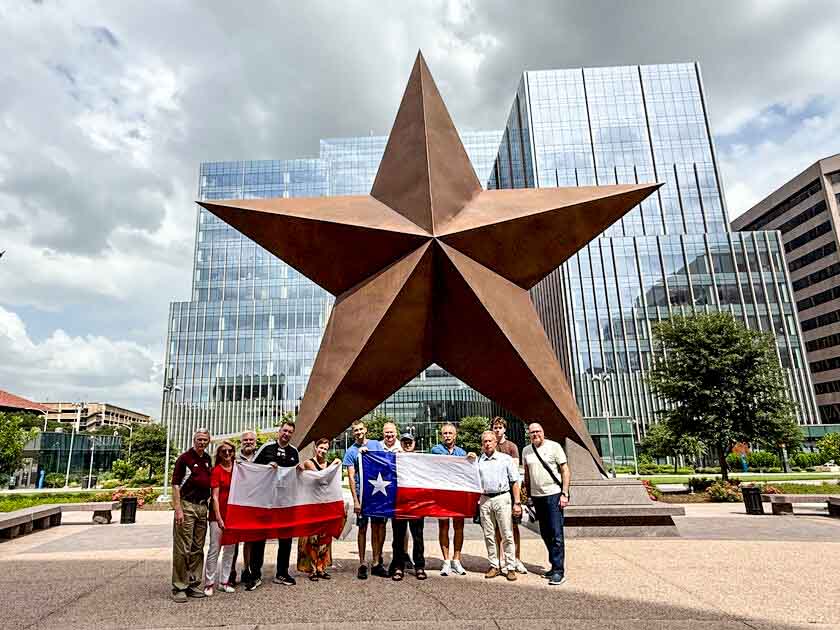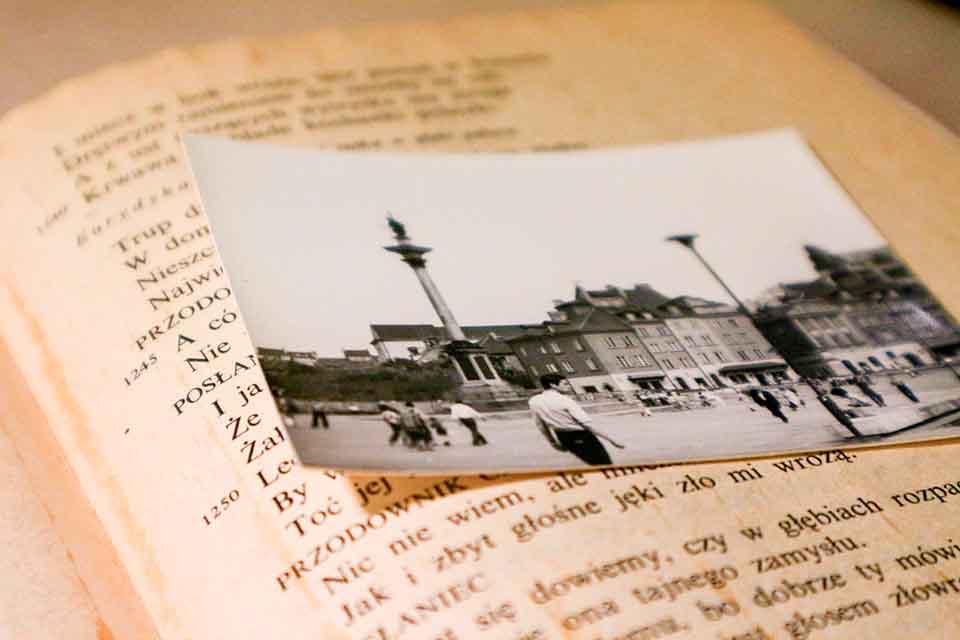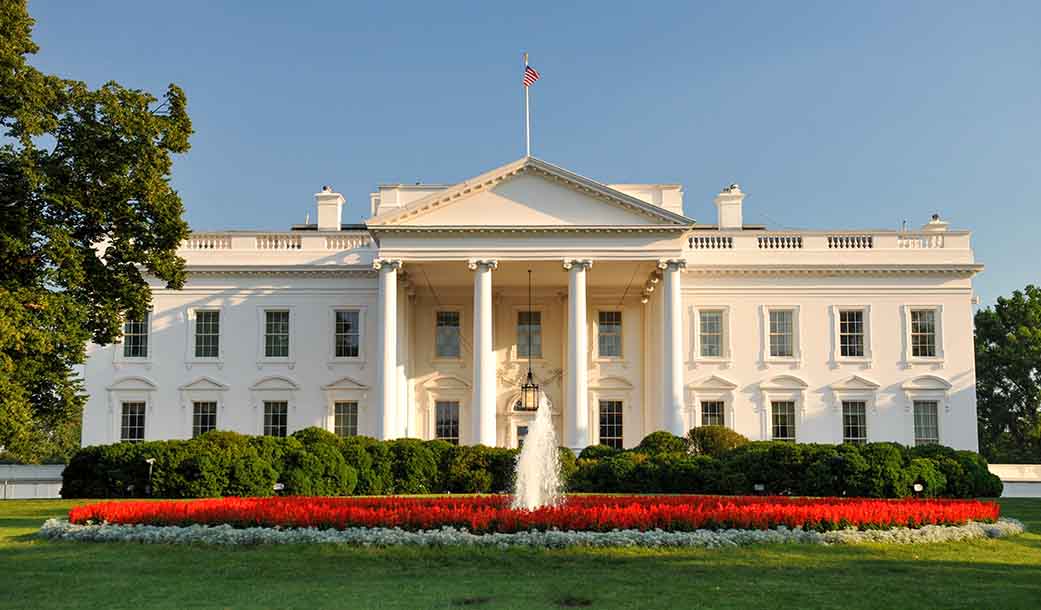Today, approximately 20 million people of Polish descent live outside of Poland, including 10-12 million in the United States. These are individuals who emigrated or were born outside of Poland but declare a strong attachment to their Polish heritage and ties to Polishness. The Polish diaspora is the fifth largest group in OECD countries. Over a quarter of Polish emigrants (28.8%) are people with higher education.
Today, when a real opportunity arises to restore the Polish diaspora to its rightful place and truly integrate the Polish diaspora into the country's public life when, for decades, the Polish diaspora has remained on the margins of national debate, despite possessing enormous potential, both human and financial, especially here in the United States, this opportunity cannot be wasted. It's time to break free from the burden of Magdalenka contracts and open Poland to people free from communist-era connections, full of energy, competence, and loyalty to their homeland.
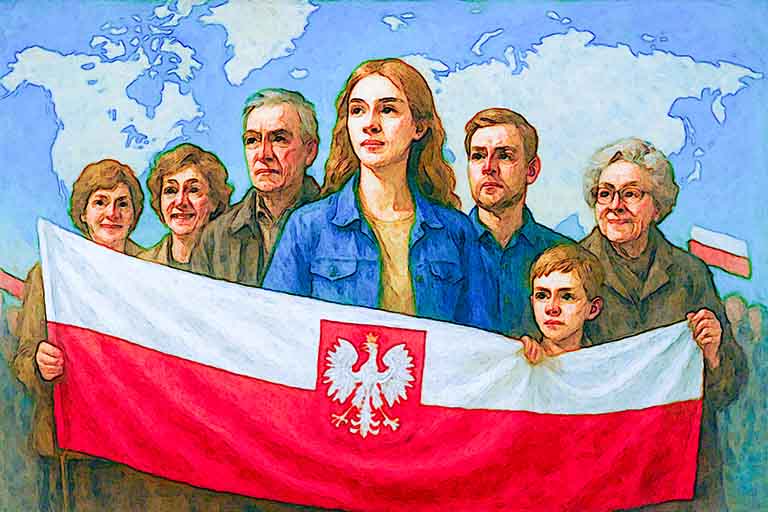
(Source: ChatGPT/A.Wozniewicz)
The Polish diaspora represents one-third of the nation living outside Poland.
It's time to incorporate into the Constitution the fact that approximately 60 million Poles live worldwide, of whom approximately 20 million are Poles and citizens of Polish descent. They should finally be recognized as an integral, independent, and valuable part of the Polish nation. It's time to break with the Magdalenka agreements, which resulted, among other things, in barring representation of patriotic, independence-oriented, and Polish emigration groups from power.Creating political representation for the Polish diaspora:
Poles abroad must regain full civil rights. Postal voting must be reinstated. To actively engage the Polish diaspora in Poland's political life, electoral law must be amended to allow Polish citizens permanently residing abroad to nominate their own candidates in parliamentary elections in a special constituency created for the Polish diaspora. Their voices must be heard in the debate on Poland and represented in the Polish parliament. This idea was presented in Kuryer Polski in 2024. The proposal is to use a continent as the constituency for candidates nominated by citizens permanently residing abroad. One constituency would be North America, the second – South and Central America. The third – Europe, and the fourth – Australia. Each constituency would have four seats – 16 in total. Why so many? Because at least 15 members must be represented by a parliamentary group, whose chairman participates in the Convention of Elders and influences the course of legislative proceedings in the Sejm. This would lay the foundations for a stable Polish lobby in the countries of settlement, and after 20-30 years, such a lobby could gain significant influence, benefiting both itself and Poland. It's a long journey, and we need to be prepared for that.The World Polish Diaspora Congress – a proposed organization that would ensure a break with the tired old Polish diaspora.
This is to ensure transparent relations between the Polish diaspora and Poland, which were effectively blocked after the Round Table Talks. A new project should be established to unlock authentic relations between the diaspora and the Motherland. After 1989, the role of the former services was assumed by certain Warsaw institutions, formally democratic, but continuing the old Magdalenka patterns. They possess extensive infrastructure, promote only individuals associated with their narrative, and benefit from Polish taxpayer funds designated for the Polish diaspora. Therefore, we propose the establishment of a new organization. The World Polish Diaspora Congress should be convened by the President of the Republic of Poland, Karol Nawrocki. All Polish diaspora organizations listed in the database prepared by Professor Jacek Gołębiowski should be invited to the founding congress. The congress should be located at the office of the President of the Republic of Poland, which would give it the status of an institution of particular importance for the Polish state and the entire diaspora. The founding Congress's task, in addition to adopting a statute and electing its leadership, would be to create an outline for transparent and professional relations between the diaspora and the Motherland. Building "soft power" and a global strategic network by connecting Poles in Poland with the diaspora is a prerequisite for Poland's success in international relations. Within its framework, mixed Polonia-Polish expert groups should be established in key areas (economics, energy, security, technology, medicine, and the military). This center should train Polish community leaders. Other tasks of the Congress include creating and developing an investment project for the Polish diaspora, enabling them to invest in Poland—the "Diaspora Investment Initiative,"—and creating a nonpartisan expert base consisting of the most renowned scientists and other professionals dedicated to Poland's development. The Congress's organizational structure should be as simplified as possible. Administrative support would be handled by the Congress Office. Its responsibilities would include managing day-to-day affairs and coordinating projects prepared by individual task forces. Its role would be to present proposals to the appropriate Polish government minister, ensure their practical implementation, monitor deadlines, and inform the task forces of progress. The smooth operation of the World Polish Congress depends on the creation and maintenance of effective communication channels between all its participants. These must operate based on clearly defined and adhered principles to ensure transparency, effectiveness, and a real impact on state policy towards the Polish diaspora. Organization of the annual Polonia–Poland Strategic Forum in a major diaspora center.A modern diaspora policy.
Not just from "the sea to the Tatra Mountains," but "from Chicago to Tobolsk." We need an active system of support for the Polish diaspora in every consular district and a modern diaspora policy. Consulates must become cross-party centers of Polish diasporal life—active, open, educational, and nonpartisan. Easier passport acquisition for children born abroad, expansion of consular services to other centers, intensification of the issuance of Polish Cards, and a realistic repatriation and return policy. Ninety-five percent of the Polish diaspora in the US does not speak Polish. Attractive educational, media, and cultural offerings are needed. Promoting student exchange, supporting the study of Polish language, history, science, and economics within the international university system.The Paderewski Institute—restoring the former importance of the Polish diaspora in North America.
Following the Hungarian example (Hungary Foundation), we should establish a government foundation in the US that would support the restoration of the former importance of the Polish diaspora and the development of a pro-Polish lobby. The best specialists from the US, Canada, and Poland should be hired to create a "Polska Team"—a team of professionals fluent in English and Polish, possessing key media skills, building bipartisan networks, and building business communities. Their task would be to build an integrated network of bilingual Polish diaspora media and integrated business communities and other organizations. Such investments could restore the importance of pro-Polish lobbying in the United States for decades. However, it's time for an awakening. New, organic work is needed: training leaders and future politicians of Polish descent. The Polish diaspora in the US must regain seats in the US Congress, as well as in state and city structures. The presence of governors, mayors, and representatives in the federal administration is a prerequisite for effectively representing Poland's interests. American Poles currently work at lower levels of government, but they lack the political springboard that would enable advancement. A coherent political program for the Polish diaspora is needed, one that would allow it to influence US domestic and foreign policy. Change also requires a profound generational shift, as the policy of permanence leads to the slow assimilation of the diaspora. Similar challenges face the Polish diaspora in Canada, Germany, France, the United Kingdom, and the Benelux countries. Leaders' actions are often subordinated to political factions within Poland, rather than the national interest. Meanwhile, Poland remains isolated in the face of pressure from the US, Germany, the European Union, Israel, and Russia.The Polish diaspora in Polish media and its role in Polish history.
The Polish diaspora co-created Independence. Since 1989, no book has been published in Poland on the history and role of the Polish diaspora. It's time for this truth to penetrate the common consciousness of Poles. It's time for consulate ceremonies marking the regaining of independence to be accompanied by the singing of "Hey, White Eagle"—a song composed in 1917 by Ignacy Jan Paderewski, which served as the battle anthem of the Polish Army in France, known as the Blue Army. Our Polish diaspora heroes deserve respect and remembrance. Research on the Polish diaspora generally focuses on Polish parishes, while the transcribed and never verified studies on the Polish diaspora media rarely address the secular Polish diaspora. It's time for the Polish government to seriously consider funding Polish diaspora departments at the country's major universities. The history of the Polish diaspora and its current state should be thoroughly researched and properly presented if Poland wants to leverage this enormous demographic asset to strengthen its position on the global stage. Currently, research on the Polish diaspora, known as the Polonia, is fragmented, uncoordinated with the country's development strategy, and often driven by foreign sources. In times of low fertility and demographic constraints, a thorough study of the Polish diaspora as Poland's demographic, cultural, political, and economic base is in the national interest. With the ever-increasing importance of global communication, every opportunity to expand international contact networks is valuable. Countries that implement a well-thought-out strategy to support their diaspora benefit in many ways: their international status, cultural recognition, economic benefits, and security improve significantly. Examining current research on the Polish diaspora and its methodology reveals that most of it is based on a deficit model, i.e., the need for assistance and care. Almost no academic or political analysis considers the study of Polonia in terms of the potential benefits it could bring to Poland… It is the duty of an independent Poland to study Polonia and share this knowledge with the world. Polonia is an undiscovered jewel, a diamond of global connectivity that should be extracted from the ashes of Poland's post-partition political catastrophe. If restored to its full glory, Polonia could become a cornerstone, a linchpin of Poland's communication with the world in cultural, economic, and national security dimensions. Let us hope that Polish universities will be adequately funded to open Polonia Departments and begin systematic interdisciplinary research on Polonia as a demographic potential and, until now, underutilized treasure of Poland."
Conclusions
To ensure the realization of Polish interests, the reform of the Polish army, political, military and economic cooperation, the idea of Intermarium, and the strategic presence of the United States on NATO's eastern flank, it is necessary to pursue an active and assertive state policy, Polish diplomacy, and exert coordinated influence of the Polish diaspora on every administration in Washington, Berlin, Brussels, Paris and Ottawa.
The Polish diaspora, especially in the United States, can play the role of an advocate for Polish affairs in the international arena — if only it is properly activated and treated as a real partner of the Polish state.








